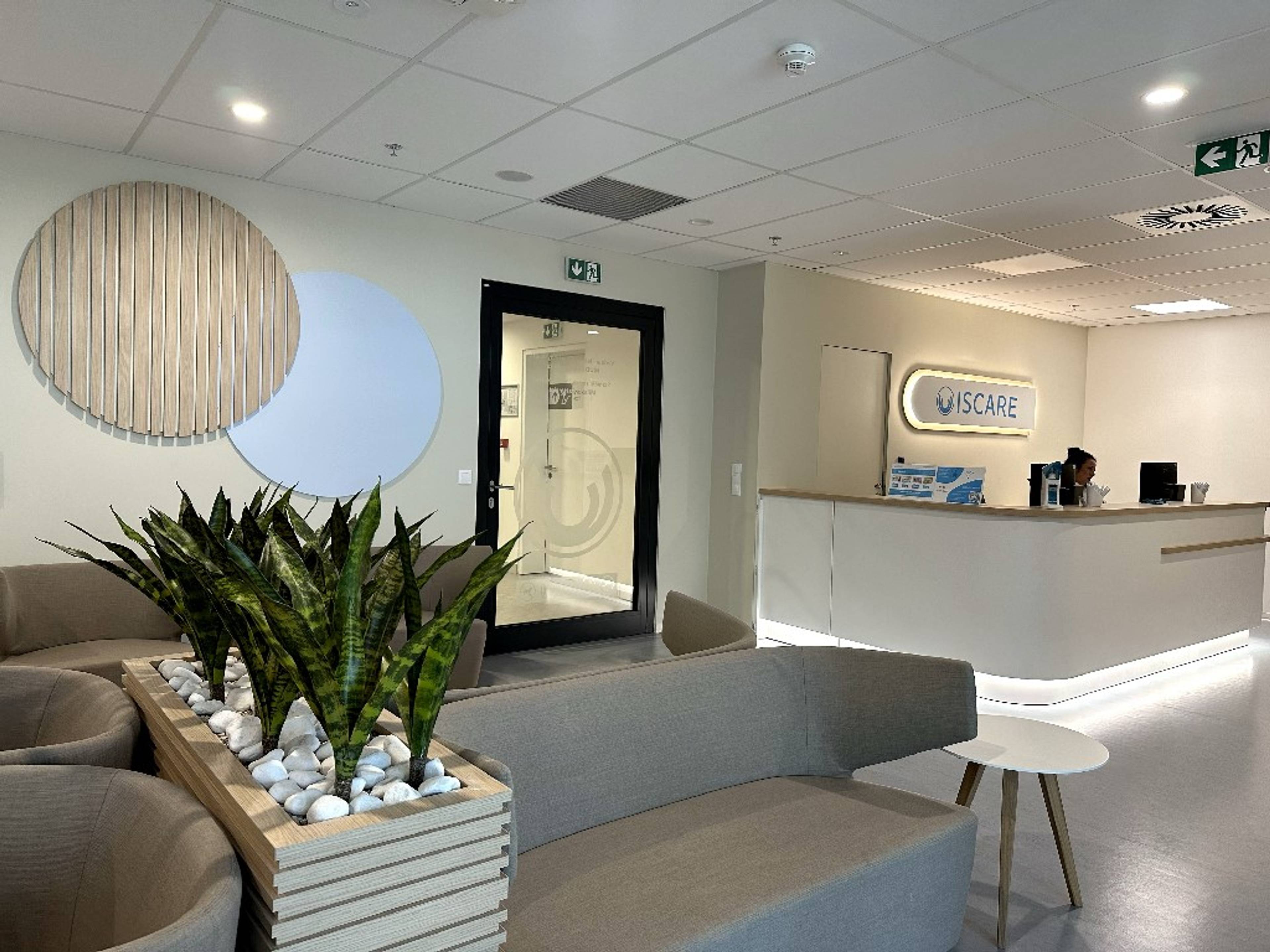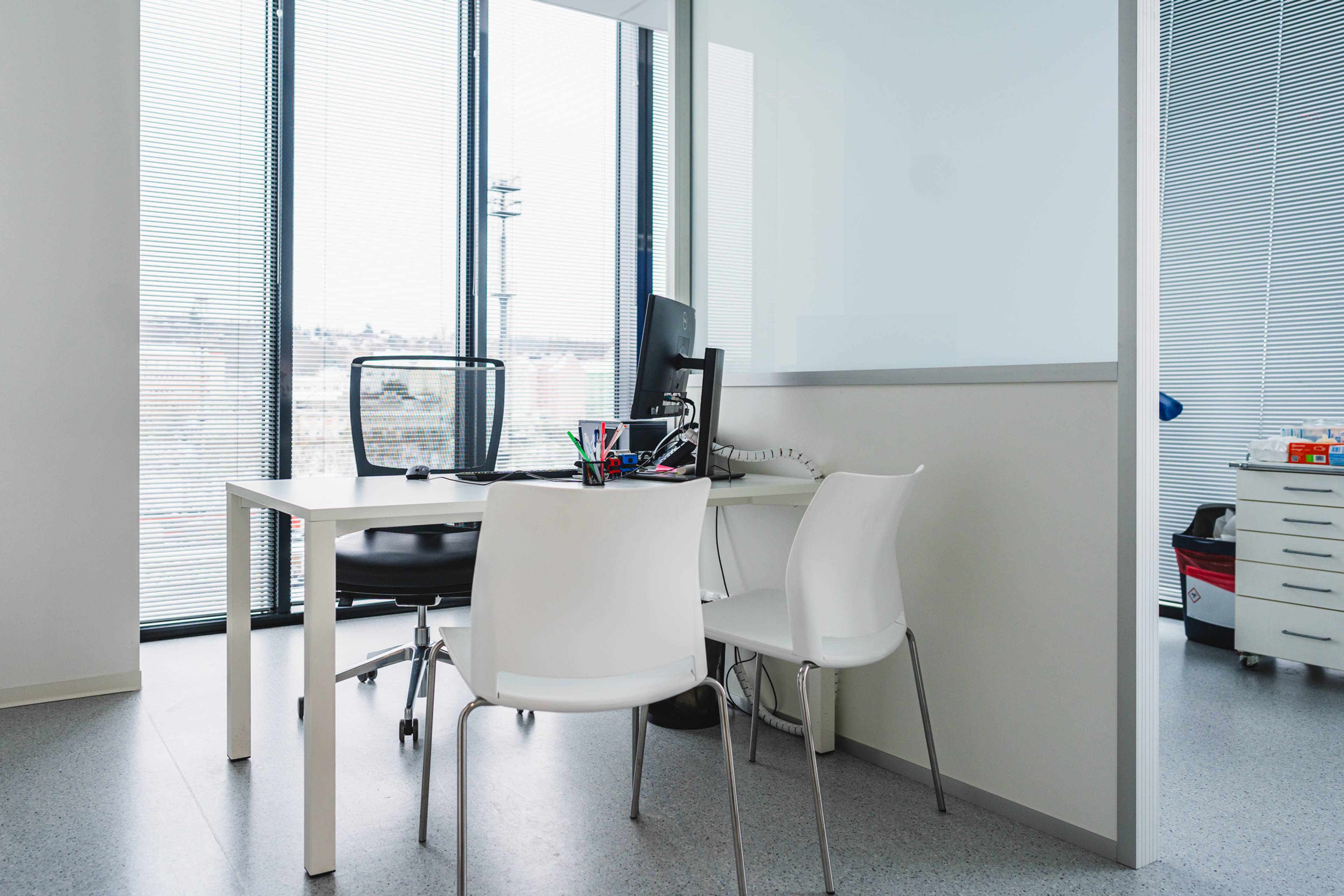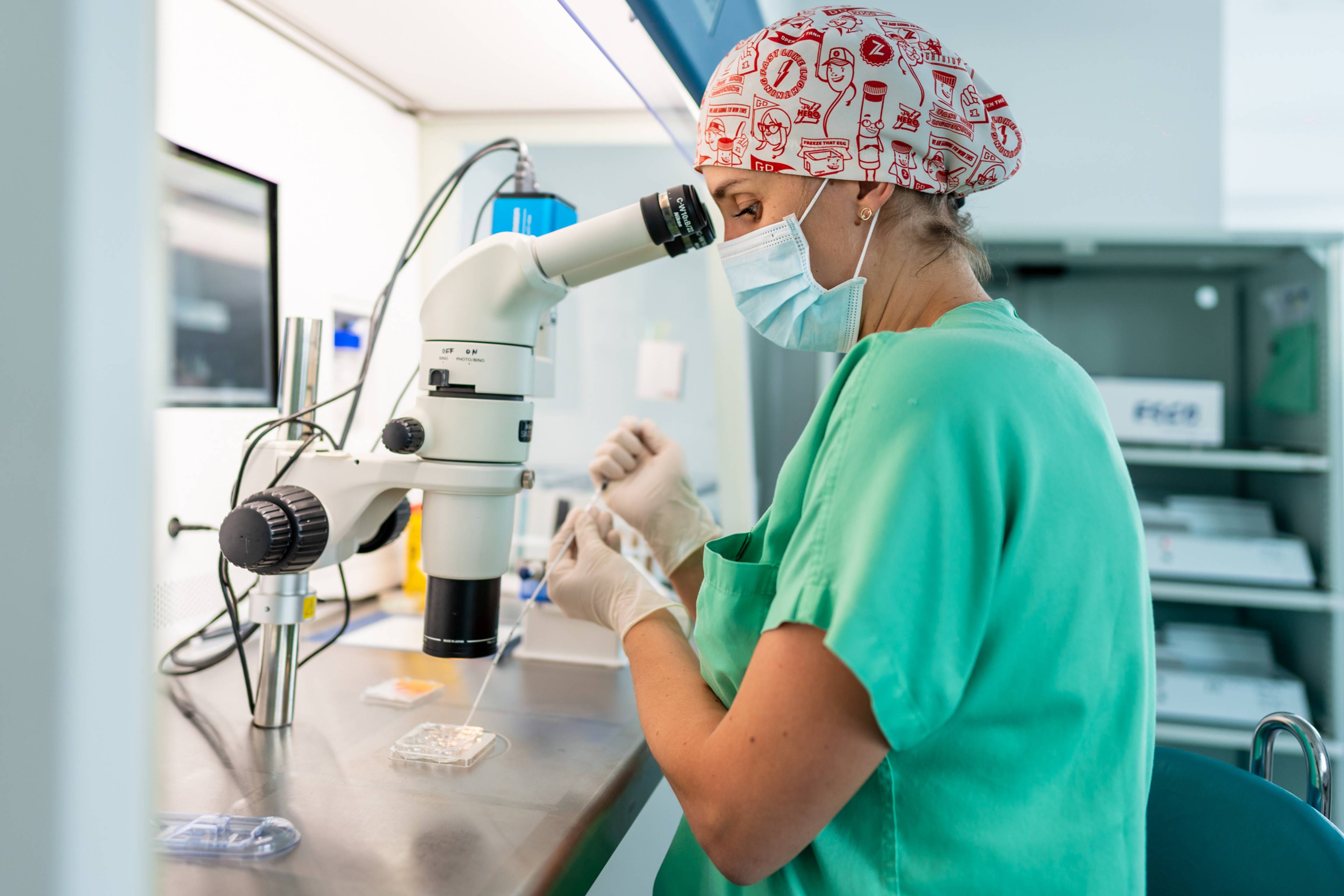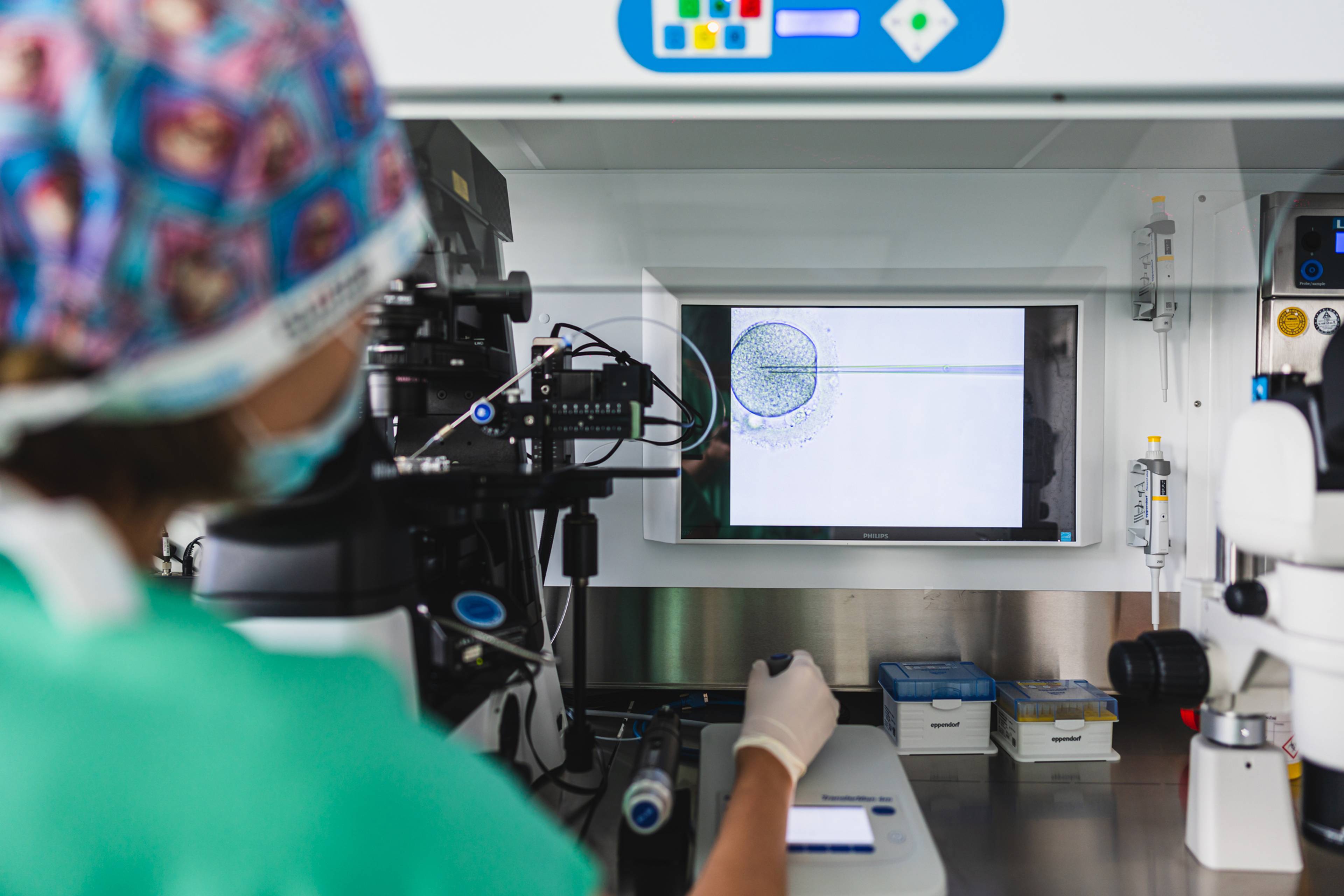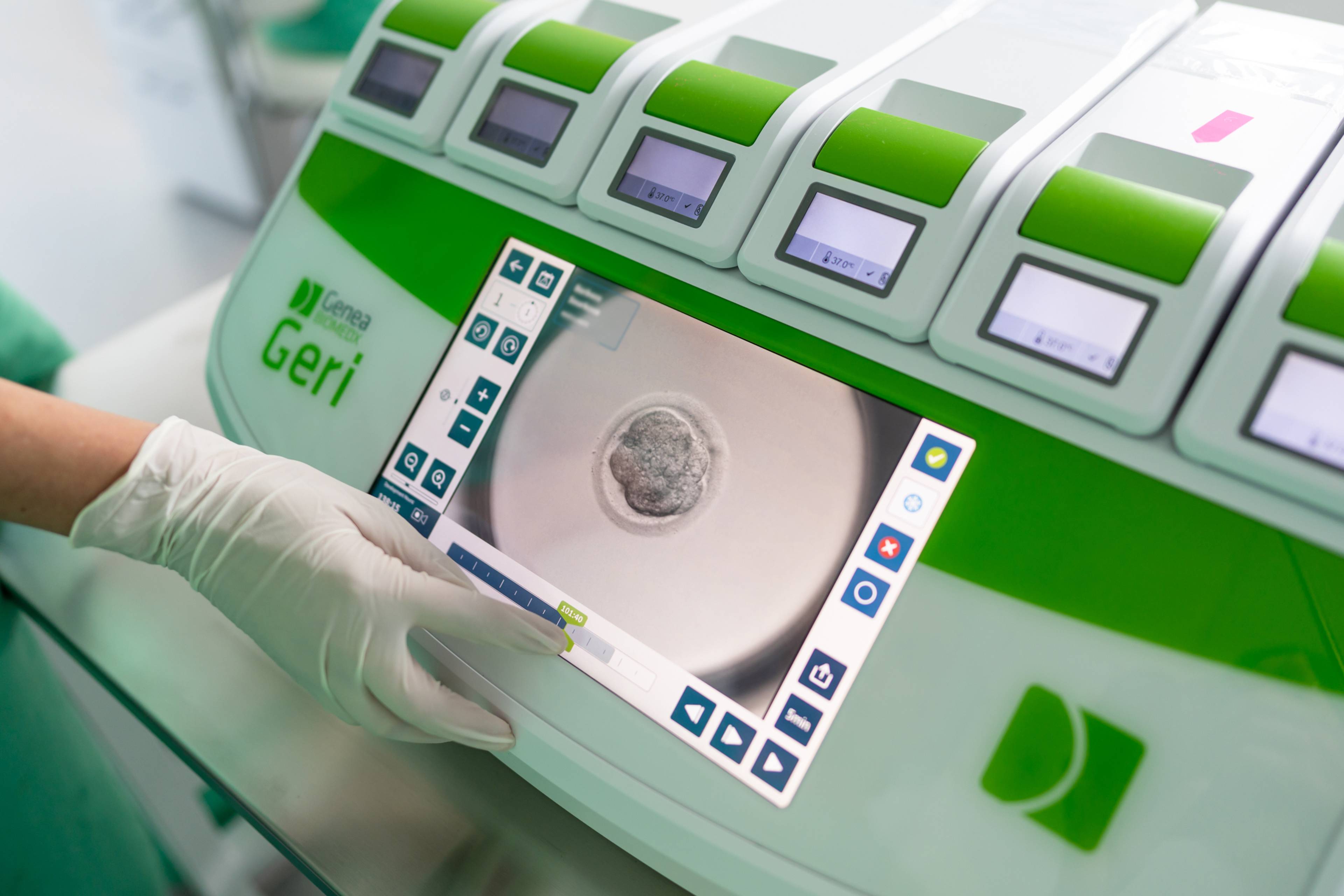Closer than you think: Book an immediate consultation online or in person
In case of long-term difficulties with conception, you can proceed the necessary examinations, consultation and possible treatment practically without waiting.
After the initial consultation, either personal or online, a qualified team of doctors will take over and, with the advice of top embryologists, will suggest the optimal course of action to address your difficulties. With an emphasis on your individual needs and a successful conception.
The process starts with a blood test, which can be done directly at the clinic on the day of your visit. Our state-of-the-art embryology, IVF andrology lab and modern operating room are also located right in the building. You will find everything you need for comprehensive fertility treatment services in one place; assisted reproduction, pre-operative testing, genetic and immunological testing, gynaecology surgical procedures and male infertility treatment (andrology).
You will receive your prescribed medication directly at our office, and our well-stocked pharmacy is also located at the same address, where you can get other medicines. For our patients, we also offer a discount.
IVF treatment
Effective treatment of fertility disorders through hormonal stimulation of the ovaries, followed by retrieval and fertilization in the embryology laboratory. Three effective methods customized to the patient's typology and difficulties.
IVF treatment with donation
If fertility problems are so severe that couples cannot have a baby from their own cells, the doctor may offer the option of IVF treatment with donated cells (eggs, sperm or embryos).
Fertility Preservation
Social Freezing is suitable for those who need to postpone parenthood until later. As age advances, cells age and their quantity and quality decline. Use the freezing of gametes for planned parenthood.
How to start your IVF journey
The main reasons for infertility
For IVF, our clinic typically schedules four appointments for the full treatment process. These appointments are a consultation, a follicular development stimulation, an egg retrieval, and an embryo transfer appointment. However, if your local physician can carry out the follicular development appointment, you may only need three appointments at our clinic.
The main reasons for infertility in women include
- Hormonal imbalance: This can prevent eggs from maturing or being released, cause abnormal womb lining development, and hinder embryo implantation.
- Blocked fallopian tubes: Inflammation, past surgeries, endometriosis, or birth defects can obstruct or prevent the egg's passage through the fallopian tubes.
- Cervical mucus issues: Insufficient or hostile cervical mucus can make it difficult for sperm to penetrate the egg's membrane.
- Thyroid disorders and hyperprolactinemia
The main reasons for infertility in men include
- Disruption of spermatogenesis: This can lead to a decreased production of healthy sperm.
- Reduction of sperm motility: Poor sperm movement can hinder their ability to reach and fertilise the egg.
- Sperm transport disturbances: Issues with transporting sperm through the reproductive tract can affect fertility.
- Systemic diseases such as diabetes and thyroid disorders.
- Sexual dysfunction, which may result from conditions like paralysis.
What is IVF?
- It’s an external technique used to help people with fertility issues have a baby
- Treatment involves your eggs being fertilised outside of your body, then embryos are implanted into the uterus
- Most people look into it after one year of trying to get pregnant with no success
- Can also be used to help prevent passing on genetic issues to a child
- One of the most common methods of artificial insemination
In vitro fertilisation is a complex assisted reproductive treatment. It involves joining an egg with sperm in the laboratory – in vitro – in order to obtain good-quality embryos, which once transferred to the mother’s uterus can lead to a pregnancy.
To perform the procedure, it is necessary for the patient to undergo controlled hormonal stimulation to procure her eggs, which will later be fertilised in vitro in the laboratory and monitored for a few days whilst they develop. One of these embryos will then be transferred back to the womb and the rest will be frozen for future use.
IVF process and how IVF works?
How the IVF process works at our clinic
- The process of IVF is in accordance with the treatment plan, which is determined by the doctor will begin with hormonal stimulation of the woman.
- Hormone stimulation is necessary to obtain a larger number of eggs, which are not normally released during a woman's regular ovulation cycle.
- The doctor verifies the progress of stimulation by ultrasound examination.
- The mature eggs are then retrieved under short-term general anaesthesia by puncturing the follicles.
- On the day of the egg retrieval, the partner undergoes semen collection.
- The eggs are then fertilised with sperm and the resulting embryos are cultured in an incubator.
- After a few days, the best embryo is transferred to the uterus of the future mother in a process called embryo transfer.
- The other embryos can be cryopreserved for further treatment.
What happens before starting IVF treatment?
We need to know which treatment suits you best, so we will make a personalised diagnosis for you. When testing both men and women before IVF, we need to distinguish between local and foreign patients – including which tests are required or which tests patients can undergo according to their diagnosis.
Women
- Ovarian reserve testing. Supporting copy example: We do this to predict how your ovaries will respond to fertility medication
- Practice embryo transfer/dummy embryo transfer
- Uterine exam
Men
- Semen analysis
For both partners
- Infectious disease screening, such as HIV
Who is IVF suitable for?
- Couples who can’t conceive and are unsure why
- Women with a diagnosed fallopian tube obstruction or endometriosis
- Women who have problems with oocyte release (issues with ovulation) and who have not conceived yet using antiestrogens
- Couples with a male sterility factor
- When a specialist geneticist recommends genetic testing of couple’s embryos, eg. in case of higher probability of transmitting serious hereditary diseases
Before first visit of clinic
What can women do before coming to the clinic:
Before your first appointment, we ask for recent PAP smear and hormonal blood test results. This includes tests for follicle-stimulating hormone (FSH), luteinizing hormone (LH), prolactin (PRL), estradiol (E2), progesterone, free triiodothyronine (fT3), free thyroxine (fT4), and thyroid-stimulating hormone (TSH). These tests should be done between the 2nd and 4th day of your menstrual cycle and no more than 6 months old. You can send results via email so our physician can review them before your appointment.
What can men do before coming to the clinic:
For male partners, semen analysis is crucial. It assesses sperm quality and guides treatment decisions. Semen collection can be done at our clinic after abstaining from sex for 2-4 days. We also store samples for future use if needed due to illness or injury.
First visit of clinic
What to expect during your consultation:
Your consultation with the physician typically lasts about an hour, during which you're encouraged to ask any questions you may have. The physician will review your test results and may recommend further analyses or tests. They will provide a diagnosis and discuss potential treatment options, along with explaining various laboratory procedures.
What to expect after your consultation:
Following the consultation, we'll supply any necessary medications and provide detailed instructions on their usage, if you choose to proceed with treatment. Additionally, to enhance treatment success, hormonal stimulation is carefully overseen by a physician to encourage the development and maturation of several eggs.
Preparatory phase
Based on the consultation with our experts and the results of the initial examinations, our experts will recommend specific methods suitable for you and set the whole treatment plan.
Sperm Collection
Part of a man's examination is a spermiogram test. Its results show us which egg fertilisation method is suitable. If the result of the spermiogram is good, the sperm can be used to fertilise the egg and frozen and stored for later use. We recommend a urologist visit if sperm is not found in the ejaculate.
These results determine the following treatment procedure, such as surgical sperm collection (TESE or MESA). If the spermiogram shows bad results or we cannot obtain viable sperm through surgery, we recommend IVF treatment with donated sperm. The couple chooses a suitable donor from our extensive database. More details can be found in Stimulated IVF cycle.
Ovulation Induction
The woman undergoes hormonal therapy to stimulate the development of multiple eggs in her ovaries. Hormonal medications may include follicle-stimulating hormone (FSH), luteinising hormone (LH), and sometimes human chorionic gonadotropin (hCG).
Egg Retrieval (Ovum Pickup)
When examining a woman, we look at the performance of her ovaries. Egg retrieval is performed under general anaesthesia and ultrasound control. The doctor then obtains the follicular fluid with eggs from the ovaries. We free the eggs from cumulus cells in the laboratory and evaluate their quality and maturity. If it is not possible for medical reasons to use the woman's eggs, we recommend IVF treatment with donated eggs. The couple chooses a suitable donor from our extensive database.
IVF success rates
Up to 50% of women become pregnant during their first IVF cycle. An important aspect is the age of the woman - from the age of 35 the quality and number of eggs decreases, which significantly affects the success of the IVF method.
How much IVF costs?
After initial consultation and examination, the doctor will recommend procedures that may increase the success rate of treatment in your specific case. Your coordinator will provide you with a complete price list of methods. If you combine multiple of them, your coordinator will offer you appropriate discounted packages. Please, find out details in our pricelist.
Patient journey
You can be pregnant in a few weeks.
Contact us
We will schedule you for a free online consultation.
Initial consultation
You and your partner come in for a consultation with the doctor.
Treatment
Together we will determine a plan and course of treatment.
Pregnancy
We will make your dream of a complete family come true.
Your stories

PhDr. Dalibor Jiříček
Fertility Care Coordinator
Contact us
Take a look
How it looks like at
Assisted Reproduction
